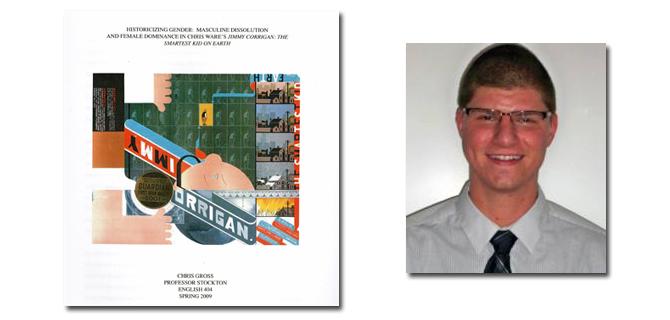
"Crafting my 404 paper on Chris Ware's 'Jimmy Corrigan: The Smartest Kid on Earth' served as a rewarding capstone for my Dickinson academic career. I can reflect contentedly on my experience within the walls of East College with my 'Modern to Postmodern' seminar and 404 group as one that prepared me to think critically with distinct focus and determination. By the end, my peers and I had learned the idiosyncrasies of each other's writing, and we had a communal sense of pride in viewing the seeds of each of our ideas come to fruition."
Excerpt from Gross' thesis, "Historicizing Gender: Masculine Dissolution and Female Dominance in Chris Ware's Jimmy Corrigan: The Smartest Kid on Earth."
"At the 1893 Columbian Exposition, Frederick Jackson Turner confirmed that the entire American landscape had been explored and that the population, according to the census boards, had exceeded 'two or more' per square mile from East coast to the West (38). Not only did this announcement mark for American history a significant change in the translatio imperii narrative, but it marked a drastic shift in world history as well. For the first time, there was no longer a mythologized West, a land of fantasy and escape for men. Instead, masculinity became trapped within increasingly urban centers, forced to accept the realities of more progressive social structures, industrialization, and capitalism.
"Frederick Jackson Turner delivered his speech 'The Significance of the Frontier in American History' as part of the many historical lectures of the 1893 Columbian Exposition. In his presentation, Turner evaluates the role of the West in American history, asserting, 'Up to our own day American history has been in a large degree the history of the colonization of the Great West. The existence of an area of free land, its continuous recession, and the advance of American settlement westward[ ... ]' (37). These beginning lines of Turner's speech are indicative of his recognition of the translatio imperii narrative . Through his diction, Turner evokes the linearity of the movement of empire, in line with Columbus's presentation of the narrative. However, along with this historical discourse, Turner recognizes that the close of the frontier marks an abrupt change. The space to reassert masculine identity has- for all purposes disappeared, conquered shortly over one-hundred years after the nation's independence.
"The male quest for the acquisition of power appears explicitly through the imagery of rape in Turner's rhetoric. Turner's language suggests the male violation of indigenous lands: 'The slender paths of aboriginal intercourse have been broadened and interwoven into the complex mazes of modern commercial lines; the wilderness has been interpenetrated by lines of civilization growing ever more numerous.' (39, my emphasis). The implicit linearity of Turner's logic, underscored by his repetition of the word 'lines,' gives the colonial narrative an almost penetrative undertone, again invoking the linear and westward movement of empire. Furthermore, according to Turner, man reasserts his agency through 'interpenetrat[ing]' the frontier (39). The phallic connotation of Turner's diction continues to invoke the imagery of rape and sexual subordination, the ultimate release for an abandoned male city-dweller on the vulnerable lands of the West (36). The originally 'slender,' aboriginal paths are 'broadened,' reiterating the violent abuse of the Westward lands (46). Francis A. Walker, a superintendent of the census, even commented, 'our settlements[ .. . ] have penetrated the Western country in every direction and from every direction' (qtd. in Juricek 28). The frontier, then, acts as free space for masculine escape from the sexually stultifying confines of the city."
What He's Doing Now
Gross teaches Advanced Placement and International Baccalaureate Spanish classes at Cumberland Valley High School in Pennsylvania. He credits the abilities he learned as an English major with allowing him to research a question related to his curriculum; to collect primary, secondary and tertiary documents; and to creatively present units to his students that will be interesting for them to study and explore.